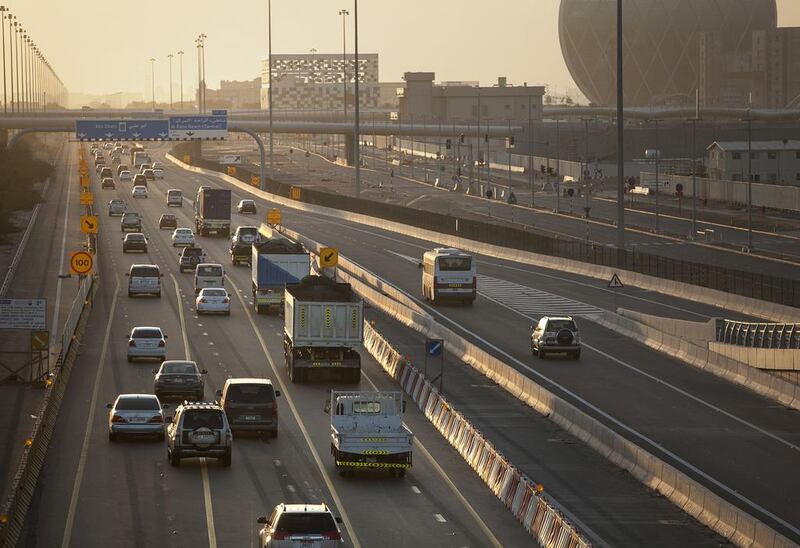ABU DHABI // Almost four in five motorists in a survey say reckless driving on the country’s roads has increased over the past five years.
Seventy-seven per cent of the 1,007 drivers polled said there were more reckless drivers on the roads than in 2009, and about a third admitted that they had been in a collision.
“It is alarming to see a perception among UAE residents that there are more reckless drivers today,” said Thomas Edelmann, founder of Road Safety UAE.
“A safer driving environment for all road users will be created if motorists change their mindset to become more considerate, patient and aware. Across the UAE there needs to be a cultural shift in attitudes to ensure motorists take responsibility for their own behaviour and look out for one another on the roads.”
More than two-thirds of respondents, or 68 per cent, said the leading cause of accidents was speeding.
That was followed by tailgating (56 per cent), being distracted from driving (47 per cent), frequent lane changes (32 per cent) and driving in the wrong lane (18 per cent).
But in a worrying trend, only half of the drivers aged between 18 and 24 believed speeding was a significant cause of accidents. For those over 40, that figure was 74 per cent.
“Many initiatives have been introduced to police reckless driving but not enough has been done to change the behaviour of drivers, especially the young ones,” said Dr Salaheddine Bendak, associate professor at University of Sharjah.
“To illustrate a point, when Germany removed speed limits on some motorways most drivers kept driving at reasonable speeds.
“Results showed that speeds recorded above 140kph on these motorways were rare, and drivers were still choosing to drive at reasonable speeds although there was no speed limit.
“This was because of the behavioural changes that Germany achieved before speed limits on their freeways were removed.”
Dr Bendak has published studies on seat belt use and tyre safety.
Thirty-six per cent of those in the youngest age group said they had already been in an accident, with 43 per cent saying they were distracted while behind the wheel.
In the first eight months of this year, there were 3,170 traffic accidents, resulting in 463 deaths and 4,4602 injuries, Ministry of Interior statistics show.
Brian Reilly, chief executive of Zurich Insurance Middle East, said he was worried about the high proportion of young UAE drivers who had already been in an accident.
“Both speed and tailgating are verified causes of road accidents and we encourage all road users to drive at a suitable speed and maintain a safe distance from other cars,” Mr Reilly said.
Effective driver training and licensing standards are critical to road safety, said Dino Kalivas, chairman of the driver education and training committee at the International Road Federation.
“In a country such as the UAE, the challenge is greater due to the constant change of the demographic and, with many people from countries with either limited driver experience or driver training and licensing standards that are lower than the UAE,” Mr Kalivas said.
“Human beings are always the weakest point in any system as drivers make mistakes.”
More vigorous road-safety initiatives in schools, parental education and an emphasis on their role in the behaviour of their children as drivers are also needed, Dr Bendak said.
“We could also have hard-hitting and emotional TV and radio campaigns, put billboards on major roads showing accident statistics, and get the private sector involved in raising road safety awareness in the workplace.”
YouGov conducted the survey for Zurich Insurance Group in June.
rruiz@thenational.ae






